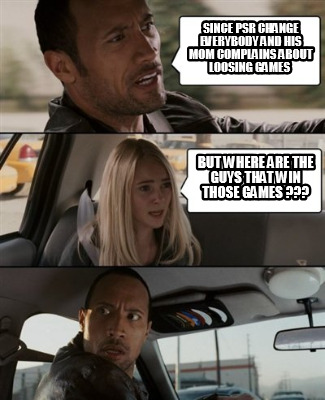 Lugh, on 21 October 2015 - 06:31 AM, said:
Lugh, on 21 October 2015 - 06:31 AM, said:
True you can't control 11 others,
Actually he can't control the 23 others.
 Paigan, on 21 October 2015 - 06:32 AM, said:
Paigan, on 21 October 2015 - 06:32 AM, said:
Of 100 games of a certain player with more less randomly (or at least unbiased) assigned team mates, the only common element is himself.
Yep out of 100 games.... he is one constant out of 23 other variables... and that's only counting the players.
So over that one hundred games... that's still one constant factor... except now it's 2300 distinct variables.
 Paigan, on 21 October 2015 - 06:32 AM, said:
Paigan, on 21 October 2015 - 06:32 AM, said:
Adding his performance is the only thing that deviates his personal 100 games from the statistical average.
This right here is just moronic.
So he (being one of variables) is capable of upsetting the statistical average...but the other 23 variables can't.
You really need to study actual mathematics.
 Paigan, on 21 October 2015 - 06:32 AM, said:
Paigan, on 21 October 2015 - 06:32 AM, said:
while all others (which are evenly distributed in the long run, no matter the selection algorithm) are supposedly the ones that are significant for his performance.
An algorithm can't "distribute" player behavior.
The fact they other players exist implies nothing at all about their chances of winning or losing.
P.s. - an "algorithm" has literally nothing at all to do with anything we're talking about. Aka - insert X players. Done. The things AFTER the algorithm are what matters.
 Paigan, on 21 October 2015 - 06:32 AM, said:
Paigan, on 21 October 2015 - 06:32 AM, said:
If you want to say something smart, make sure it's really smart and not based on rhetorical ambiguity to make a kind of senseless pseudo-point.
I'm sorry you've only taken Statisics 101?
P.s - I find it amusing you think differential equations and indefinite mathematics to be "rhetorical ambiguity".
Aside: This important thing that everyone overlooks.
A statistical average applied to a system only applies to THAT system.
So any given team may have a 50/50 chance of winning....If every player on both teams stayed the same.... and THEN he didn't even out to a 50/50 average.... THEN he would be the cause....
BUT the second you switch out the variables... you've created a NEW system.
Any given player may be considered a system....but when you add 11 variables... or 23 variables... you've created a new system.
You can't (well you can if you want to be wrong) simply say (x+y+z) and (w+r+v) both have 3 variables so screw it let's pretend they describe the same thing.
They don't.
Edited by The Atlas Overlord, 21 October 2015 - 07:45 AM.











































